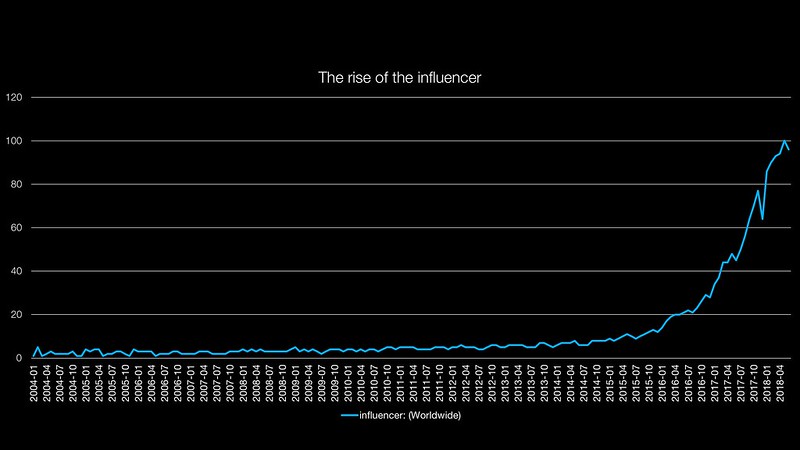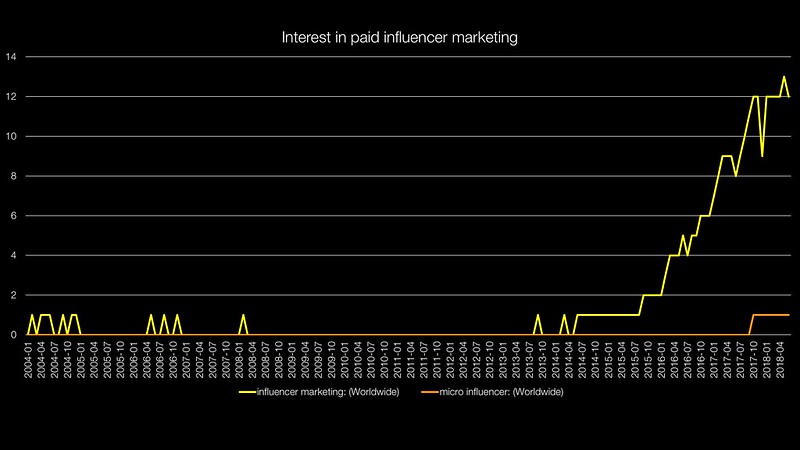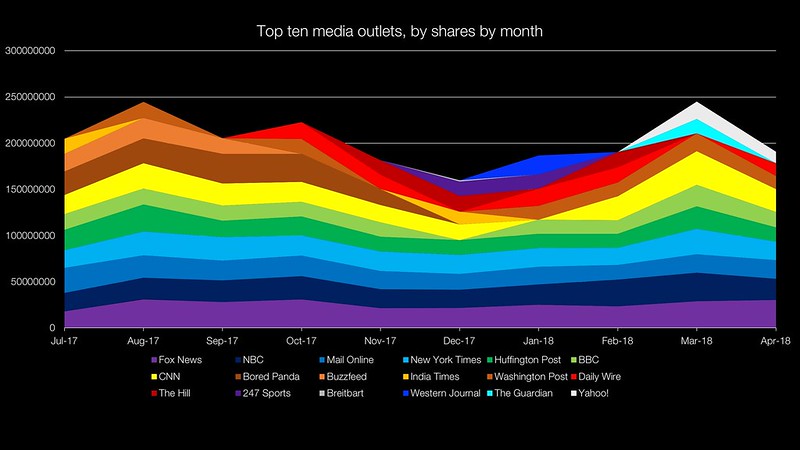Mark Ritson wrote an op-ed over at Marketing Week on influence and influencers. Whilst it lacked nuance on the subject area, a lot of what it said is true. Go over and have a read; I’ll be waiting for when you come back.
Whilst I disagree on the finer points, what Ritson wrote needed to be said. There needed to be a turning of the tide on influencers from boundless optimism to a greater degree of sobriety and critical analysis of the influencer opportunity.
I first noticed this boundless optimism when I attended the In2 Innovation Summit in May last year. Heather Mitchell on a panel. Mitchell worked at the time in Unilever’s haircare division where she is director, head of global PR, digital engagement and entertainment marketing. I asked the panel discussing influencer marketing about the impact of zero-based budgeting (ZBB) and the answer was ducked. ZBB requires a particular ROI on activity, something that (even paid for) influence marketing still struggles to do well.
This was surprising given the scrutiny that other marketing channels were coming under, I couldn’t understand how influencer marketing merited that leap of faith.
This time last year I noted:
Substitute ‘buzz marketing’ for ‘influencer marketing’ and this could be 15 years ago. Don’t get me wrong I had great fun doing things like hijacking Harry Potter book launches when I worked at Yahoo!, but no idea how it really impacted brand or delivered in terms of RoI. Influencer marketing seems to be in a similar place.
Just five years ago we had managed to get past the hype bubble of social and senior executives were prepared to critically examine social’s worth. In the meantime we have had a decline in organic reach and massive inflation in both ad inventory and influencer costs. What had changed in the marketers mentality?
Onward with Mark Ritson’s main points.
Ritson’s Three Circles of Bullshit
A very loose reference to Dante Alighieri’s Divine Comedy trilogy; but for modern marketers
The First Circle of Bullshit: Are the followers real?
- Are they bots?
- Are they stolen accounts?
- Are the user accounts active any more?
- Has the account holder padded their account with bought followers and engagement. Disclosure – I ran an experiment on my Twitter account and still have a substantial amount of fake followers. More on this experiment here.
The Second Circle of Bullshit: Are influencers trusted?
- Ritson did an unscientific test that showed (some) influencers would post anything for a bit of money
The Final Circle of Bullshit: Do they have influence?
- Some influencers are genuinely authoritative; but this is a minority of influencers out there
- Ritson alludes to the lack of organic reach amongst an ‘influencers’ followers which is likely to be 2% reach or less
Trends in influence
I looked at Google Trends to see what could be learned in the rate of change in searches over time. Consider Google Trends to be an inexact but accessible measure of changes in interest over time.
Global interest in influencers have been accelerating

There has been a corresponding rises in interest around paid influencer marketing

There hasn’t been the same interest peak in organic (PR-driven) influencer work

All of which supports the following hypotheses:
- it’s become on-trend from the perspective of marketers, agencies and ‘influencers’
- A significant amount of influencers are in it for the money – which brings into question their (long term authority and consumer trust)
- A significant amount of influencers have an exceedingly good idea of their value (more likely overly-inflated)
- Ego is less of a motivator for becoming an influencer than material gains
What would influence look like?
Propagation of the content by real people. Instagram, a particularly popular influencer channel, has made sharing posts difficult for followers historically. Re-gramming was a pain in the arse for the average Instagram user.

If we look at the mainstream media and how it is shared on Facebook we see that only five media brands are consistently in the top ten most shared media properties. ‘Traditional’ influencer status isn’t necessarily a garrantor of consistent successful propagation either, if Newship’s data is to be believed.
Attributed sales. Some luxury brands in China have had success collaborating with influencers and selling through their channels; the post child being Mr Bags collaboration with Longchamps.
How is the best way to use influencers in marketing?
Assuming that you are using influencers in the widest possible sense at the moment.
Treat the majority of influencers as yet another advertising format
That means that reach, the way the brand is presented, and repetition are all important – smart mass marketing following the playbook of Byron Sharp.
- Viewing your influencer mention in that prism, it means estimating what the real reach would be (lets say 2% of the follower number as an estimate) and paying no more on a CPM rate than you would pay for a display advertising advert
- Ensure that the brand is covered in the way that you want. Some luxury brands have managed to get around this by keeping control of the content; a good example of this is De Grisogono – a family-run high jewellery and luxury watch brand. They work with fashion bloggers that meet their high standards and invite them to events. De Grisogono provides them with high-quality photography of its pieces and the event. They get the high standard of brand presentation which raises the quality of the placement
- Get repetition with the audience by repeating the placement with other content that delivers the same message with the same high standard of production
All of this might work for a luxury brand, IF you found that the amount of agency time and creative work made commercial sense. It is less likely to work for normal FMCG brands. What self-respecting influencer is going to be bossed around by a breakfast cereal?
Thinking about micro influencers, probably the area that has had the most interest from marketers recently due to them appearing to be better value than macro influencers.
Brown & Fiorella (2013) explanation of micro-influencers:
Adequately identifying prospective customers, and further segmenting them based on situations and situational factors enables us to identify the people and businesses – or technologies an channels that are closest to them in each scenario. We call these micro-influencers and see them as the business’s opportunity to exert true influence over the customer’s decision-making process as opposed to macro-influencers who simply broadcast to a wider, more general audience.
Brown & Fiorella focus on formal prospect detail capture and conversion.
This approach is more likely to work in certain circumstances; where there is low friction to conversion (e-tailing for discretionary value items).
It starts to fall apart when you deploy their approach to:
- Consumer marketing
- Mature product sectors
- Mature brands
You would also struggle with many B2B segments where social provides a small reach and little social interaction.
Work with real influencers on long term collaborations
- There is more likelihood of having audience trust if they can see and understand the long term relationship between a brand and its influencers
- Better brand placement easier, with an influencer that ‘gets’ the brand
- You’ve got a better chance of being able to get access and fully understand the underlying analytics of their accounts (which should be a prerequisite for long term relationship)
- You can look at collaborations and attribution payment models that raise all boats
- You can lock out rivals out of relationships
More information
Mark Ritson: How ‘influencers’ made my arse a work of art | Marketing Week
Edelman Digital Trends Report – (PDF) makes some interesting reading
Instagram Marketing: Does Influencer Size Matter? | Markerly Blog
Influence Marketing: How to Create, Manage and Measure Brand Influencers in Social Media Marketing by Danny Brown & Sam Fiorella ISBN-13: 978-0789751041 (2013)
Facebook Zero: Considering Life After the Demise of Organic Reach
Quantifying the Invisible Audience in Social Networks – Stanford University and Facebook Data Science
PLOS ONE: Detecting Emotional Contagion in Massive Social Networks by Lorenzo Coviello,Yunkyu Sohn, Adam D. I. Kramer,Cameron Marlow, Massimo Franceschetti, Nicholas A. Christakis, James H. Fowler
Senior Execs Not Convinced About Social’s Worth | Marketing Charts
Measuring User Influence in Twitter: The Million Follower Fallacy – Cha et al (2010) – (PDF)
Visualizing Media Bias through Twitter. Jisun An. University of Cambridge. Meeyoung Cha. KAIST. Krishna P. Gummadi. MPI-SWS et al – (PDF)
Mr. Bags x Longchamp: How to Make 5 Million RMB in Just Two Hours | Jing Daily
It’s time that we talk about micro-influencers
